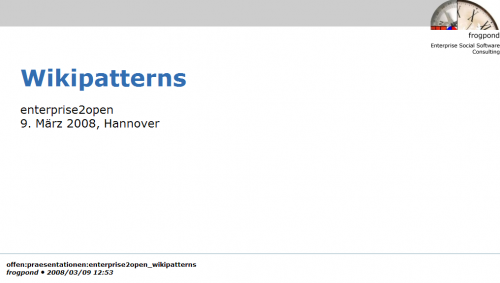Im Rahmen der Content Management Arena habe ich am CeBIT Samstag ein aktuell laufendes Kundenprojekt vorgestellt (“Erfolgsfaktoren der Wiki-Einführung in KMUs”). Zusammen mit einem internenen Projektteam der Firma Chevalier Pipes Technologies CPT führe ich ein Wiki als Ergänzung eines bestehenden Intranets ein, und habe von unseren Zielen und Erfahrungen berichtet.
Die möglichen (internen und externen) Einsatzarenen habe ich eher allgemein vorgestellt, im Gegensatz zu den Vorgehensweise und Erfahrungen, die wir im Projektverlauf gemacht haben. Dies war mir wichtig, weil ich deutlich machen wollte, dass die Umsetzung eines Wikis in KMU kein längerfristiges und teures Projekt sein muss, sondern dass dies – die entsprechende Projektbegleitung und -unterstützung vorausgesetzt – schnell und kostengünstig geschehen kann. Zentral ist, dass Kunde und Berater eng zusammenarbeiten, weil nur gemeinsam der Projekterfolg gesichert werden kann.
Hier die Folien:
Dirk Röhrborn von Communardo berichtet ebenfalls von der Veranstaltung, und betont dass es sich bei CPT nicht um ein IT-Unternehmen im eigentlichen Sinne handelt. Ja, hierdurch ergeben sich sicherlich spezifische Herausforderungen – vor allem in Bezug auf Schulung, Coaching und Helpdesk. Diese anzugehen und tragfähige Konzepte zu entwickeln und umzusetzen ist eine der wichtigeren Beratungsaufgaben in diesem Kontext.

